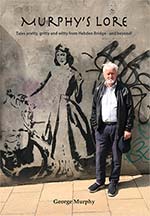
Third series, episode 14
All 106 episodes are available here on the HebWeb.
Episode 14 of Season 3 includes a funday for Laura Kuensberg and basking in the park, Marriage and recreational drugs, tales about telling tales, nappies and nipples, an African monster, a dream awakening, Queen Elizabeth and Bob, and a town hall declaration.
Mellow fruitfulness

This year's quince are the size of small apples
Funday with Laura Kuensberg
The interview with PM-to-be Liz Truss on the new Sunday morning political programme went disastrously wrong for the presenter when studio guest Joe Lycett used over enthusiastic applause and cheering in response to the soon to be Number 10 tenant's non answers to Laura's gentle probing, thus breaking the unwritten rules for political broadcasts.
This fun tactic reminded me of the 60s, when protestors attending right wing rallies pretended to be supporters of politicians such as Enoch Powell, Keith Joseph and South African ministers, by blowing party poppers, throwing streamers and bursting balloons. After his own sarcastic applause, Lycett said, "Liz Truss walked out of the studio with a face on her like an arse that had just been slapped."
In 2004, the PM-to-be rented a house along our street whilst campaigning in the General Election against Labour incumbent Chris McCafferty, but caused a scandal when local Tories discovered their young, recently married candidate was in a relationship with her 'election minder' Mark Field, MP.
Perhaps a blue plaque should be commissioned to commemorate the new PM's one time love nest?
Park life
The week before going back to school, Rosie entertained us with a monster mask she'd made, whilst her mum went off to one of her three jobs. I took her to the park.
Nine's a good age, kids are still excited by life, and at the park I basked in the sunshine, confident that Rosie wouldn't fall from the climbing frame. She made friends for an hour with a girl she didn't know, then we went off to the toyshop on Market Street.
That night, TV news was dominated by the deaths of innocent victims of drug gang shootings in Liverpool, one of whom was a nine year old girl.
Marriage and machetes
We watched Marriage, the mini series scripted by Stefan Golaszewski. Although I missed the surreal comedy of his Mum series, we stayed with it. I especially enjoyed the last episode, in which the wife berated her boss for his recreational use of cocaine, asking him if he ever felt guilty for funding a crime that depends on young lads acting as couriers for murderous gangsters.
Recently, a teacher friend, who has moved to Shropshire from London, told me a dozen boys who attended the primary school where she once taught had died in their teens. One lad was forced to hide a stash of drugs under his bed, only for another gang to break in and steal it. As punishment for the loss of their precious merchandise, gang bosses had him murdered with a machete.
Tell tales
Half a century ago, male headteachers of many junior schools in Halifax were recruited from the PE departments of local secondary modern schools, despite having no previous experience of teaching young children. In 1974, one of them contacted his old PE teacher training college in Chester and asked them to send 'a likely lad' to teach a class of junior pupils. The college had broadened its remit by then to encompass the whole school curriculum, including Eng Lit, and they sent me along.
At a staff meeting in my first term the Head said too many children at the school were lazy, and we should "keep them working till four o'clock," thus ending the customary end of day story time. 'If it's pleasant, it's bad for you,' was his motto. I ignored his command.
Three decades later I wrote an introduction to a book I co-edited on storytelling in schools.* Here's an extract:
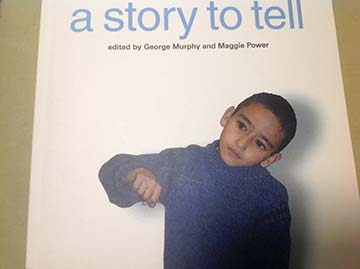
'Some of my favourite memories of infant school are the afternoons when white haired Miss Jones unlocked the book cupboard and told us that we could rest our heads on our desks and listen to a story. The Magic Faraway Tree easily transported her class of 42 infants to a world brimming with more possibilities than the dreary confines of 1950s Ellesmere Port.
In my second year at school we had a young, newly qualified teacher called Miss Kopak, whose family had probably escaped from Soviet invasion at the end of the war. Miss Kopak allowed us to get out from behind our desks in the afternoons to play in the sand tray or the Wendy House, and afterwards she would sit us around her on tiny chairs and read to us from a storybook with pictures in it. Or sometimes she would tell us a tale. The ancient spell she conjured up is what this book is about: teller and author without the authored text between them, each reacting to the other, sharing a story but experiencing their own imagined version of the tale.
The girls loved Goldilocks and the three bears, with its clever ratcheting up of tension and the spoken bits when we all joined in. As listeners we shared a secret knowledge and the excitement never failed to mount as we waited for the sleeping girl to be discovered.
Even more frightening was Red Riding Hood. The strangeness of a girl who couldn't distinguish between her granny and a wolf in a petticoat only enhanced our enjoyment as we joined in with the dialogue. The rescue of the slightly distressed, but not too badly damaged, old woman from the wolf's belly only added to the story's fascination.
But the story I liked best was Jack and the Beanstalk. As with The Magic Faraway Tree, the story took us to a world beyond the clouds. I always felt sorry for the ogre's wife; mealtimes must have been demanding, and she was stern but kind to Jack. But the ogre was satisfyingly bad enough for us not to worry too much about Jack's appropriation of his property. Best of all, the story had a good chase scene and I felt an affinity for a hero who was famous for getting things wrong.
I once read a student's retelling of this tale where the ogre and Jack became friends.
Done sharply, these satirical retellings can work well. In a similar reworking I've seen a troll threatened with an ASBO, after a complaint from neighbouring goats, before agreeing to undertake anger management training. In this case, the troll embraced vegetarianism and shared his wealth with Jack's family. This sorted out the social situation but killed the story. Whatever else happens, you have to keep the "Fee Fi Foh Fum!"
I wrote a picture book version of Jack and the Beanstalk, in a series for African children. The editors persuaded me to change my chorus of "Fee Fi Fo Fum! I smell the blood of a farmer's son! Be he alive or be he dead, I'll grind his bones to make my bread!" to "Fee Fi Fo Fum! I want to eat the little boy!" This retains the basic message, but I think the chorus loses something.'
*A story to tell, edited with Maggie Power (Trentham 2009).
Nappies and nipples
In teacher education I once worked with Frances, an early years' lecturer, who googled a query about 'potty training and toiletting' and, instead of helpful suggestions to assist young trainees, she was inundated with images of 'Men in Nappies'.
Similarly, in response to my recent research into medieval folk lore, the Pinterest algorithm has sent me a startling array of images.
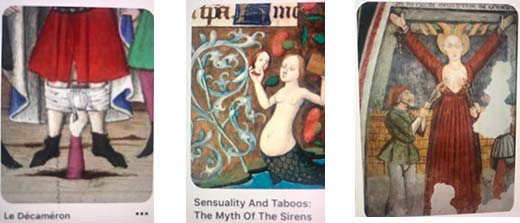
A tale for Africa
Twenty years ago I was asked to contribute to a reading scheme for African children who were learning to read English as a second language. In a book for more accomplished readers, I reacted to a legendary African monster with a tale inspired I think by 'May I?' which I played as a child, or 'What's the time, Mr Wolf?' a playground game played by children I've taught.
Abiyoyo*
Tika, Brima and Daniel were walking home from school. It was very hot. The journey along the dusty road was long and tiring. They came to a short cut, where a path curved through long, brown grasses past a baobab tree. There was a small rocky hill beyond the tree. Some people said Abiyoyo the monster lived in a cave in the rocks.
Daniel was hot and tired. He wanted to take the short cut. He was frightened of Abiyoyo, but he thought he might be brave if his friends came with him.
"It's too hot to walk home this way," said Daniel. "Let's take the short cut beside the dried up river, past the baobab tree."
"Abiyoyo the monster lives in the cave next to the baobab tree," Tika said. "My sister says Abiyoyo has horns as sharp as knives."
Brima said, "My brother says Abiyoyo's roar is as loud as a lion's."
"My brother says Abiyoyo eats little boys," said Daniel. "His belly is as big as the drum they play on Festival day. But I don't believe in Abiyoyo. Let's take the short cut."
Tika said, "I will take the short cut if you go right up to the mouth of the cave, to find out if there really is a monster."
Brima said, "Then you must shout, 'Abiyoyo, Abiyoyo, I'm not afraid of you'!"
Daniel didn't want to show them he was afraid. He said, "I agree to your challenge, but only if you two are one step behind me when I get to the cave."
Brima and Tika whispered to each other. They were just as proud as Daniel. They came forward and shook hands with him, to show they would keep their word.
The boys walked thorugh the long brown grasses. They walked along the narrow path beside the dried up river. They walked past the baobab tree. Then they walked more slowly to the foot of the rocks.
"If you don't want to go up to the cave, we will understand," said Tika. "We can creep past the cave. We will never tell anyone how frightened you were."
"I want to go up to the cave," said Daniel. "If you two are too frightened, I will understand. I will never tell anyone how frightened you were."
"Don't worry about us," said Brima. "We will stay one step behind you."
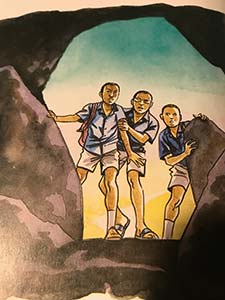 So the three boys walked up the twisting track to the mouth of the cave. Then Daniel stepped forward. "Abiyoyo, Abiyoyo! Great horned Abiyoyo! Are you alive or dead!" he shouted. No answer came from the cave."Then we'll take one stride, two strides, three strides. We're not afraid!" he shouted. He took three large strides into the cave. Tika and Brima followed.
So the three boys walked up the twisting track to the mouth of the cave. Then Daniel stepped forward. "Abiyoyo, Abiyoyo! Great horned Abiyoyo! Are you alive or dead!" he shouted. No answer came from the cave."Then we'll take one stride, two strides, three strides. We're not afraid!" he shouted. He took three large strides into the cave. Tika and Brima followed.
"Abiyoyo, Abiyoyo! Loud roaring.
Abiyoyo!" said Daniel. "Are you alive or dead?"
Again, no reply came from the cave. "Then we'll take one step, two steps, three steps. We're not afraid!" Daniel took three steps into the cave. Tika and Brima followed.
Then Daniel whispered, "Abiyoyo! Abiyoyo! Drum-bellied Abiyoyo! Are you alive or dead?" There was still no sound from the darkness. "Then we'll tiptoe one step, tiptoe two steps, tiptoe three steps. We're not afraid!" So Daniel tiptoed forward and Tika and Brima tiptoed after him.
For a moment, all they could see were the dark shadows at the back of the cave. Then they saw two monster horns. Then they heard a horrible monster roar.
"GNNURRRRRRR!!!"
Tika and Brima and Daniel ran as fast as they could. They ran down the twisty track.
They ran past the baobab tree. They ran along the narrow path beside the dried-up river. They ran thorough the tall brown grasses of the bush. They ran until they got to the dusty road. Then they looked back, but they could not see Abiyoyo. All they could see was a cow rubbing its head against the fat trunk of the baobab tree.
"Abiyoyo will eat that cow when night falls," said Daniel.
They set off again along the dusty road. It was cooler now. The sun had started to sink towards the horizon. They walked on until they heard a shout. It was Daniel's father who had come to greet them.
"Where have you been? You are late. I was worried you might have gone past the baobab tree. There are dangerous creatures around that place. They take shelter in that cave back there."
Later that night the boys told their tales to their younger brothers and sisters. They told them they had seen Abiyoyo in his cave. Daniel told his little sister about the monster's great sharp horns, his roar as loud as a lion's and his monster belly, as big as a bass drum from eating little boys and girls.
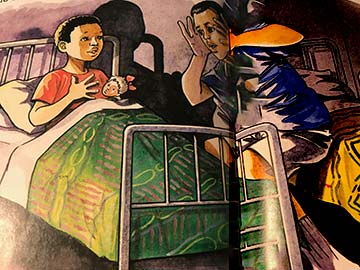
*Macmillan (2003)
In dreams
Whoah! One morning I awoke, nearer 9 than 8, from a cool affirmatory vision. I'd lost something, a coat or hat, as I'm wont to do, and a few kind friends, Paul among them, took me to gaze on a leafless sunlit bush, from under which a dozen or so white doves fanned out and fluttered off. Then a snazzy Brazilian dude walked forward, searched beneath the hedge, pulled out a smart Panama hat, then threw it with a white flourish in a fluttering arc that landed softly-plonk on my head, and a small crowd applauded. From under its brim I saw the cool-dude-hat-magician come forward and when face to face he smiled and nodded.
I'm used to waking from little disquieting nightmares of regret and guilt. But not that morning.
The Queen and Bob
Thursday afternoon, the Queen 'died peacefully in her bed.' That evening I attended the Haworth Storytelling Circle and told a tale set in the early years of Elizabeth's reign.
That's Bob all over
And finally …
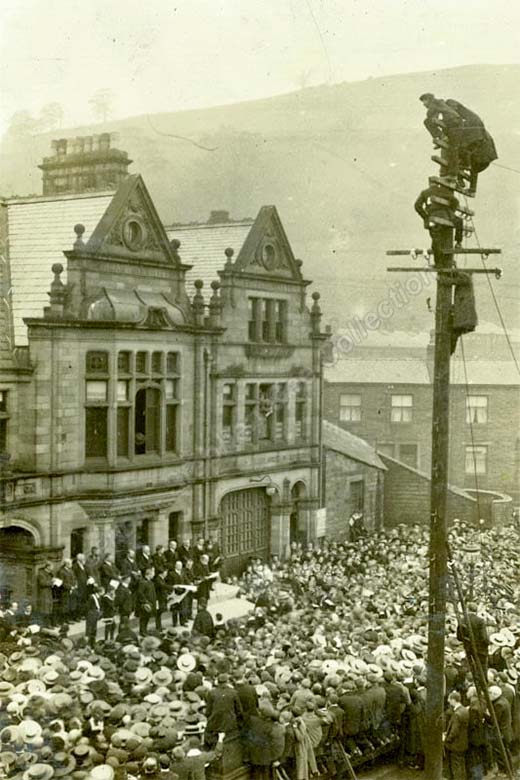
Don't think mass gatherings after a royal death are a new thing. Here's the crowd outside Hebden Bridge Town Hall to hear the proclamation of the new king in 1911.
Murphy's Lore, the book is available to order here
If you would like to send a message about this piece or suggest ideas, email George Murphy
More Murphy's Lore
See the Murphy's Lore home page for all 106 episodes.


